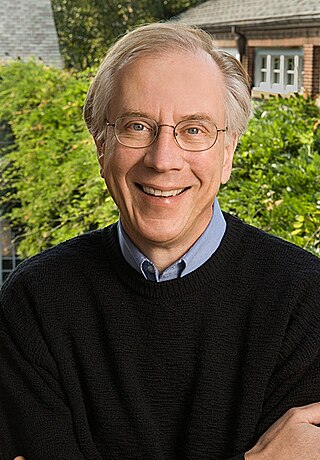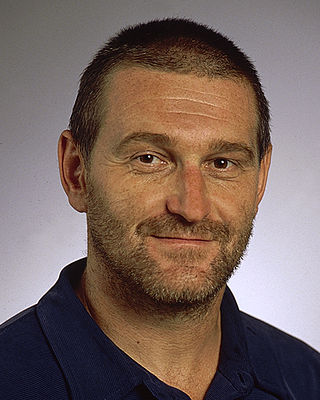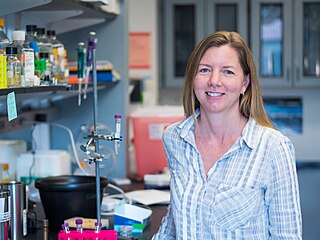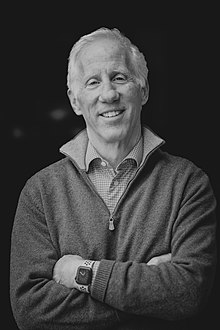
Carlos José Bustamante is a Peruvian-American scientist. He is a member of the National Academy of Sciences.

Thomas Robert Cech is an American chemist who shared the 1989 Nobel Prize in Chemistry with Sidney Altman for their discovery of the catalytic properties of RNA. Cech discovered that RNA could itself cut strands of RNA, suggesting that life might have started as RNA. He found that RNA can not only transmit instructions, but that it can act as a speed up the necessary reactions.

Peter Walter is a German-American molecular biologist and biochemist. He is currently the Director of the Bay Area Institute of Science at Altos Labs and an emeritus professor at the Department of Biochemistry and Biophysics of the University of California, San Francisco (UCSF). He was a Howard Hughes Medical Institute (HHMI) Investigator until 2022.

Susan Randi Wessler, ForMemRS, is an American plant molecular biologist and geneticist. She is Distinguished Professor of Genetics at the University of California, Riverside (UCR).
Lawrence S.B. Goldstein is a professor of cellular and molecular medicine at University of California, San Diego and investigator with the Howard Hughes Medical Institute. He receives grant funding from the NIH, the Johns Hopkins ALS Center, the HighQ Foundation, and the California Institute for Regenerative Medicine. In 2020 he was elected to the National Academy of Sciences.

Eva Nogales is a Spanish-American biophysicist at the Lawrence Berkeley National Laboratory and a professor at the University of California, Berkeley, where she served as head of the Division of Biochemistry, Biophysics and Structural Biology of the Department of Molecular and Cell Biology (2015–2020). She is a Howard Hughes Medical Institute investigator.

Daniel Edward Koshland Jr. was an American biochemist. He reorganized the study of biology at the University of California, Berkeley, and was the editor of the leading U.S. science journal, Science, from 1985 to 1995. He was a member of the United States National Academy of Sciences, the American Academy of Arts and Sciences, and the American Philosophical Society.

Barbara J. Meyer is a biologist and geneticist, noted for her pioneering research on lambda phage, a virus that infects bacteria; discovery of the master control gene involved in sex determination; and studies of gene regulation, particularly dosage compensation. Meyer's work has revealed mechanisms of sex determination and dosage compensation—that balance X-chromosome gene expression between the sexes in Caenorhabditis elegans that continue to serve as the foundation of diverse areas of study on chromosome structure and function today.
Brigid L. M. Hogan FRS is a British developmental biologist noted for her contributions to mammalian development, stem cell research and transgenic technology and techniques. She is currently a Professor in the Department of Cell Biology at Duke University, Born in the UK, she became an American citizen in 2000.
Robert Tjian is a Hong Kong-born American biochemist best known for his work on eukaryotic transcription. He is currently professor of biochemistry and molecular biology at the University of California, Berkeley and an Investigator of the Howard Hughes Medical Institute (HHMI). On April 1, 2009, Tjian became the President of HHMI. On August 4, 2015, he announced that he would step down as President at the end of 2016.
Utpal Banerjee is a distinguished professor of the department of molecular, cell and developmental biology at UCLA. He obtained his Bachelor of Science degree in chemistry from St. Stephen's College, Delhi University, India and obtained his Master of Science degree in physical chemistry from the Indian Institute of Technology, Kanpur, India. In 1984, he obtained a PhD in chemistry from the California Institute of Technology where he was also a postdoctoral Fellow in the laboratory of Seymour Benzer from 1984-1988.

Pavel Arkadevich Pevzner is the Ronald R. Taylor Professor of Computer Science and director of the NIH Center for Computational Mass Spectrometry at University of California, San Diego. He serves on the editorial board of PLoS Computational Biology and he is a member of the Genome Institute of Singapore scientific advisory board.
Zhijian "James" Chen is a Chinese-American biochemist and professor in the department of molecular biology at University of Texas Southwestern Medical Center. He is best known for his discovery of mechanisms by which nucleic acids trigger innate and autoimmune responses from the interior of a cell, work for which he received the 2019 Breakthrough Prize in Life Sciences.
Richard Amasino is a professor of biochemistry and genetics at the University of Wisconsin-Madison. He got his bachelor's degree in biology at Pennsylvania State University. He went on to receive his PhD in biochemistry at Indiana University in 1982 and did post doctoral research at the University of Washington. Amasino's research focuses on plants and how plants know when to flower. In 2006 he was elected to the National Academy of Sciences.
David A. Agard is a professor of biochemistry and biophysics at the University of California, San Francisco. He earned his B.S. in molecular biochemistry and biophysics from Yale University and his Ph.D. in biological chemistry from California Institute of Technology. His research is focused on understanding the basic principles of macromolecular structure and function. He is a scientific director of the Institute for Bioengineering, Biotechnology, and Quantitative Biomedical Research and has been a Howard Hughes Medical Institute (HHMI) investigator since 1986.
Ronald R. Breaker is an American biochemist who is a Sterling Professor of Molecular, Cellular, and Developmental Biology at Yale University. He is best known for the discovery of riboswitches. His current research is focused on understanding advanced functions of nucleic acids, including the discovery and analysis of riboswitches and ribozymes.
Mark A. Krasnow is a Professor of Biochemistry at Stanford University School of Medicine. He earned his B.S. in Biology and Chemistry from the University of Illinois in 1978, his Ph.D. in biochemistry in 1983, and his M.D. in 1985 from The University of Chicago under the guidance of Nicholas R. Cozzarelli. He did his postdoctoral work on the Ultrabithorax gene with David Hogness at Stanford University. He has been a professor at Stanford since 1988 and is currently the chair of the program. His research is focused on understanding the molecular, genetic, and cellular mechanisms of tracheal development using drosophila and mice. He has been a Howard Hughes Medical Institute (HHMI) investigator since 1997 and is a Fellow of the American Association for the Advancement of Science and the American Academy of Arts and Sciences. He has been elected as the National Academy of Medicine in 2016, and the National Academy of Sciences in 2019.

Erin K. O'Shea is an American biologist who is president of the Howard Hughes Medical Institute (HHMI). In 2013, she was named HHMI's vice president and chief scientific officer. Prior to that, she was a professor of molecular and cellular biology and chemistry and chemical biology at Harvard University. In 2016, her appointment as future, and first woman, president of HHMI was announced. She has been a Howard Hughes Medical Institute (HHMI) investigator since 2000.

Michael Neil Shadlen is an American neuroscientist and neurologist, whose research concerns the neural mechanisms of decision-making. He has been Professor of Neuroscience at Columbia University since 2012 and a Howard Hughes Medical Investigator since 2000. He is a member of the Kavli Institute for Brain Science, a Principal Investigator at the Mortimer B. Zuckerman Mind Brain Behavior Institute and an elected member of the National Academy of Medicine and National Academy of Sciences.

Gia Voeltz is an American cell biologist. She is a professor of Molecular, Cellular and Developmental Biology at the University of Colorado Boulder and a Howard Hughes Medical Institute Investigator. She is known for her research identifying the factors and unraveling the mechanisms that determine the structure and dynamics of the largest organelle in the cell: the endoplasmic reticulum. Her lab has produced paradigm shifting studies on organelle membrane contact sites that have revealed that most cytoplasmic organelles are not isolated entities but are instead physically tethered to an interconnected ER membrane network.











